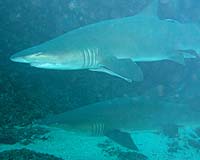| . |  |
. |
Chicago (AFP) July 20, 2009 Fish have lost half their average body mass and smaller species are making up a larger proportion of European fish stocks as a result of global warming, a study published Monday has found. "It's huge," said study author Martin Daufresne of the Cemagref Public Agricultural and Environmental Research Institute in Lyon, France. "Size is a fundamental characteristic that is linked to a number of biological functions, such as fecundity - the capacity to reproduce." Smaller fish tend to produce fewer eggs. They also provide less sustenance for predators - including humans - which could have significant implications for the food chain and ecosystem. A similar shrinking effect was recently documented in Scottish sheep and Daufresne said it is possible that global warming could have "a significant impact on organisms in general." Earlier research has already established that fish have shifted their geographic ranges and their migratory and breeding patters in response to rising water temperatures. It has also been established that warmer regions tend to be inhabited by smaller fish. Daufresne and his colleagues examined long-term surveys of fish populations in rivers, streams and the Baltic and North Seas and also performed experiments on bacteria and plankton. They found the individual species lost an average of 50 percent of their body mass over the past 20 to 30 years while the average size of the overall fishing stock had shrunk by 60 percent. This was a result of a decrease in the average size-at-age and an increase in the proportion of juveniles and small-sized species, Daufresne said. "It was an effect that we observed in a number of organisms and in a number of very different environments - on fish, on plankton, on bacteria, in fresh water, in salt water - and we observed a global shrinking of size for all the organisms in all the environments," Daufresne said in a telephone interview. While commercial and recreational fishing did impact some of the fisheries studied, it "cannot be considered as the unique trigger" for the changes in size, the study published in the Proceedings of the National Academy of Sciences found. "Although not negating the role of other factors, our study provides strong evidence that temperature actually plays a major role in driving changes in the size structure of populations and communities," the study concluded. Share This Article With Planet Earth
Related Links Darwin Today At TerraDaily.com
 Shark attack victims fight for their attackers
Shark attack victims fight for their attackersWashington (AFP) July 19, 2009 They may have lost fingers, or perhaps even an arm or leg, but these former surfers and vacationers paced down the halls of Congress in Washington to seek protection for sharks, their very attackers. "I'm here to lobby for the bill to save the sharks, I lost my arm. It's a very powerful statement," said Al Brenneca, a 52-year-old who was attacked by a shark in 1976 in Florida. Along with ... read more |
|
| The content herein, unless otherwise known to be public domain, are Copyright 1995-2009 - SpaceDaily. AFP and UPI Wire Stories are copyright Agence France-Presse and United Press International. ESA Portal Reports are copyright European Space Agency. All NASA sourced material is public domain. Additional copyrights may apply in whole or part to other bona fide parties. Advertising does not imply endorsement,agreement or approval of any opinions, statements or information provided by SpaceDaily on any Web page published or hosted by SpaceDaily. Privacy Statement |